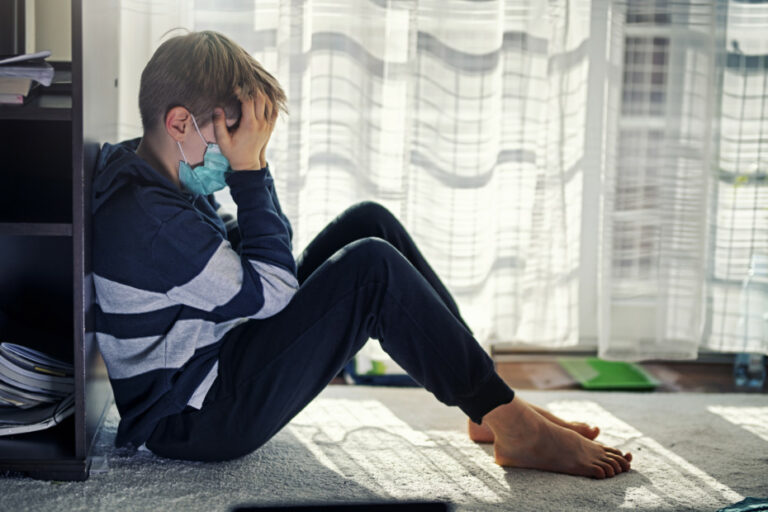
13 October 2020, Kathmandu
COVID-19 pandemic has brought an unprecedented situation leaving a sense of fear and anxiety worldwide. It has made us compelled to confront many complications relating to different aspects of life. Most importantly, the outbreak has led to menace on mental and psychosocial health for children.
The nature and extent of impact on children depend on many vulnerability factors such as the developmental age, current educational status, having special needs, pre-existing mental health condition, being economically under privileged and child/ parent being quarantined due to infection or fear of infection.
According to UNESCO, there are more than 2.2 billion children in the world who constitute approximately 28% of the world’s population. Those aged between 10 to 19 years make up 16 % of the world’s population. Due to the fear of infection of the deadly virus, children are being deprived of getting education at school. With the closure of schools, children lack access to resource material, peer group interactions and opportunities of learning so far.
COVID-19 pandemic has impacted the lives of people around the world including children with special needs in an unprecedented manner which may continue to have increased long-term adverse consequences on them.
These children with special needs like autism, attention deficit hyperactivity disorder, cerebral palsy, learning disability, developmental delays and other behavioral and emotional difficulties encounter challenges during the current pandemic.
They have intolerance for uncertainty and there is an aggravation in the symptoms due to the enforced restrictions and unfriendly environment which does not correspond with their regular routine. Also, they face difficulties in following instructions, understanding the complexity of the pandemic situation and doing their own work independently.
This global pandemic has hardly hit the mental and psychosocial health of children. As they are unable to involve in lively learning, they have been facing complications such as fatigue, obscenity, anxiety, frustration, loneliness, post -traumatic stress disorder, mood disorder, cyber bulling, social isolation among others.
Forcing millions of people to go into lockdown has caused enormous disruptions of daily routines for the global community, especially children. This transition away from physical classes has posing a potential risk to the mental well-being of children.
Incidences of domestic violence, child abuse, adulterated online contents are on the rise. The children from marginalized communities are particularly susceptible to the infection and may suffer from extended ill-consequences of this pandemic, such as child labor, child trafficking, child marriage, sexual exploitation and death etc.
Countries across the globe are still in dilemma to resume the schools, colleges and universities physically due to the fear of infection of the virus as the only way to stem its infection is to maintain social distancing.
The COVID-19 pandemic has had a devastating impact on the education of children from poorer backgrounds and is widening the gap between rich and poor and boys and girls, a new global survey by Save the Children revealed today. In the six months since the pandemic was announced, the most vulnerable children have disproportionately missed out on access to education, healthcare, food, and suffered the greatest protection risks.
Due to the enforcement of the prolong lockdown time and again, a child’s mental development has been found to be drastically impacted as lacking in care from their parents and fulfilling children basic needs has become a threat to obtain productive lives.
It must be noted still some families and parents are struggling to feed their children as many were dependent on school programs or food stamps, and not all families with resources can provide adequate supplies. Some children have parents who work on the front lines to combat the pandemic of COVID-19 which may impact them thinking about their parents while other have parents who have recently been terminated.
In this way, COVID-19 can seriously leave a negative impact on children’s mental health as other traumatic experiences human may face. In order to help mitigate the pandemic, restrictions have been imposed everywhere which may not be the solution indeed.
However, it is paramount to encourage and adopt healthy behavior to maintain the overall well-being of families. Along with the social distancing guidelines urged by the WHO, one must be aware of the safety health measures to be followed to fight against the virus. Children should be so far kept away from the possible risk which may cause negative impression on them.
Social media sites including other media outlets must be careful while sharing the information relating to COVID-19. On the top of that, it is crucial that parents provide enough support to their children and help them to process the information regarding the pandemic to minimize their anxiety or fear.
Parents, pediatricians, psychologists, social workers, hospital authorities, government and non-governmental organizations have important roles to play to mitigate the psychosocial ill-effects of COVID-19 on children and adolescents. To provide the basic amenities, social security, medical care, and to minimize the educational inequities among the children of the different strata of the society are foremost priorities.









